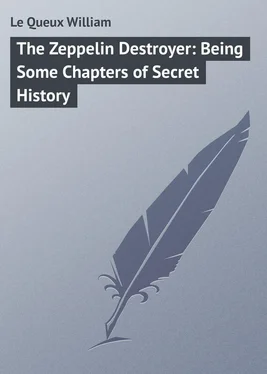William Le Queux - The Zeppelin Destroyer - Being Some Chapters of Secret History
Здесь есть возможность читать онлайн «William Le Queux - The Zeppelin Destroyer - Being Some Chapters of Secret History» — ознакомительный отрывок электронной книги совершенно бесплатно, а после прочтения отрывка купить полную версию. В некоторых случаях можно слушать аудио, скачать через торрент в формате fb2 и присутствует краткое содержание. Жанр: foreign_prose, на английском языке. Описание произведения, (предисловие) а так же отзывы посетителей доступны на портале библиотеки ЛибКат.
- Название:The Zeppelin Destroyer: Being Some Chapters of Secret History
- Автор:
- Жанр:
- Год:неизвестен
- ISBN:нет данных
- Рейтинг книги:3 / 5. Голосов: 1
-
Избранное:Добавить в избранное
- Отзывы:
-
Ваша оценка:
- 60
- 1
- 2
- 3
- 4
- 5
The Zeppelin Destroyer: Being Some Chapters of Secret History: краткое содержание, описание и аннотация
Предлагаем к чтению аннотацию, описание, краткое содержание или предисловие (зависит от того, что написал сам автор книги «The Zeppelin Destroyer: Being Some Chapters of Secret History»). Если вы не нашли необходимую информацию о книге — напишите в комментариях, мы постараемся отыскать её.
The Zeppelin Destroyer: Being Some Chapters of Secret History — читать онлайн ознакомительный отрывок
Ниже представлен текст книги, разбитый по страницам. Система сохранения места последней прочитанной страницы, позволяет с удобством читать онлайн бесплатно книгу «The Zeppelin Destroyer: Being Some Chapters of Secret History», без необходимости каждый раз заново искать на чём Вы остановились. Поставьте закладку, и сможете в любой момент перейти на страницу, на которой закончили чтение.
Интервал:
Закладка:
It was a phenomenon such as had never before been witnessed by any experimenter in electricity. The theories I had formed and so often discussed with Teddy were now proved to be quite sound, for they had resulted in the construction of that apparatus which must, I knew, be most deadly to any Zeppelin.
The sparks, as we watched them, suddenly ceased.
For a moment I stood surprised, yet next instant realised that Teddy had, no doubt, some very good reason for stopping the engine. Somebody might have come upon the scene, and we were always extremely cautious that nobody should know in what we were engaged. The neighbours knew us as airmen, and believed we were engaged in making some kind of new propellers.
What I had seen in those few minutes, the flashing crackling sparks running over the surface of those porcelain insulators and, indeed, over part of the wooden pole – for it happened to have been raining until an hour before, and all the surfaces were damp – was, to me, sufficient to cause me to hold my breath in excitement.
“We have made a great and most important discovery to-day, Roseye,” I said as calmly as I could, as together we walked back to the shed. “This discovery is undreamed of by Germany. It will give us power over any Zeppelin which dares to come to our shores, providing that we can approach sufficiently near.”
“Ah! if you can,” replied the girl at my side. “No doubt we shall increase the range,” I replied. “We have, this evening, established the one most important fact that our apparatus is really capable of directing the rays, and that between metal and metal we can now, as Hertz endeavoured to, set up an electric spark from a distance.”
“You certainly have done that – but I don’t yet see the trend of your argument, Claude. I know I’m only a woman and unversed in technicalities, so please forgive me, won’t you?”
“Well,” I said as we walked, my arm linked in hers. “First, as you know, a Zeppelin is constructed mostly of aluminium, its stays and practically all its rigid parts are of that metal except some of light steel. It consists of a number of ballonets filled with highly inflammable gas, and around those ballonets are ribs of aluminium and steel. There must be joints in these ribs, and over those joints we have now proved that we can create sparks from a considerable distance. From the ballonets there is a constant leakage of gas, therefore if we charge the aluminium and steel so that they spark wherever there is the slightest gap we shall ignite that escaping gas and cause the whole airship to explode with terrific force. Do I explain it clearly?”
“Quite, Claude,” was her slow, thoughtful reply. “I see now in what direction all these wonderful and patient experiments have been made. To-night you have certainly produced sparks.”
“And ere long I hope we shall increase our range, and be able to do without half the current and all its consequent paraphernalia,” was my confident reply. “I’m certain,” I said, “as certain as we are walking here together, that we have at last established a sound means of protecting Great Britain against Zeppelin raids.”
“I hope you have, dear,” Roseye replied. “Oh! what a great thing it will be for the country. You and Teddy will deserve monuments – if you really can succeed.”
“We shall succeed, darling – with your assistance. I’m confident of that!”
“I – how can I help?”
“In many ways. You’ve already assisted us enormously,” I said. “Teddy was only saying so to-day,” and I gripped her arm more tightly, as we turned the corner and approached the shed where Ashton was, we knew, awaiting us.
“Splendid, my dear fellow!” I cried as we re-entered. “Sparking beautifully, all over – like fireworks!”
“Pretty dangerous fireworks!” my friend remarked. “I cut off the current just now.”
“Yes,” I said. “Why?”
“Well, do you know, old chap, I thought I heard somebody about!” he replied. “Even with the dynamo running I fancied I overheard voices. Therefore I cut off at once, and went outside to see. Strangers seemed to be somewhere at the back.”
“Did you find anyone?” Roseye asked.
“Nobody – yet I’m quite certain I heard voices,” he insisted.
“Some of the men from the market-garden perhaps,” I remarked.
“I don’t think so,” was Teddy’s reply.
“Why not?” I demanded in surprise.
“Well – because what I heard – and I tell you, Claude, I heard it quite distinctly – was a sudden exclamation of surprise.”
“Surprise!”
“Yes. As though somebody had made an unexpected discovery,” Teddy said. “I had just been watching the effect on the pole through your glasses, and had returned inside when I heard an exclamation, followed by some quick words of surprise that I could not catch. It was a man’s voice.”
“Surely there could not be anybody else watching the sparking upon the pole!” I exclaimed in quick apprehension.
“That’s just what I believe has happened,” Ashton replied seriously. “We’ve been watched – as I suspected we were.”
“You’ve said so all along, I know.”
“And now I’m quite convinced of it. And whoever has watched us making our experiments now knows that to-night our efforts have been crowned with success.”
“Well,” I remarked after a pause. “If what you say is true, Teddy, we shall have to be very wary in future. I know there are a great many unscrupulous persons who would be ready to go to any length in order to learn this secret discovery of ours which, when fully developed, will, I feel convinced, mean the buckling-up of the Zeppelin menace.”
“That’s quite true, Claude,” Roseye declared. “At Hendon and elsewhere there are, I know, a number of men intensely jealous of your success, and of the one or two ideas which you have patented, and which are now adopted in the construction of our military aeroplanes.”
“It’s really astonishing how many enemies one makes quite unintentionally!” declared Teddy, leaning against the bench. “Claude has more than I have, I believe – and I never disguise from myself that I’ve got a really fine crop.”
“Only the other day, when Lionel dined with us, he was speaking to dad about spies,” Roseye said. “He told us that he felt sure that we had men in our air-service who sent every new development and idea to Germany. Do you think that’s really a fact?”
“A fact!” I echoed. “Why, dearest, of course it is! We’ve seen the result of it many times. As soon as we had that integral propeller the Germans knew, and copied us; the secret of Jack Pardon’s new dope was known in a few days, and the enemy are using it on every one of their machines to-day. Nothing is secret from those brutes.”
“But who does all this?” asked Roseye.
“Why, what I call the Invisible Hand,” was my reply. “The Invisible Hand was established in our midst in about 1906, when the Kaiser sat down and craftily prepared for war. He saw himself faced by the problem of the great British power and patriotism, and knew that the Briton would fight every inch for his liberty. Therefore the All-Highest Hun – the man who will be held up to universal damnation for all time – proceeded to adopt towards us the principle of dry-rot in wood. He started a system of sending slowly, but very surely, his insect-sycophants to burrow into the beam of good British oak which had hitherto supported our nation. That beam, to-day, is riddled by these Teutonic worms – insects which, like the book-worm, are never seen, yet, directed by the Invisible Hand, are only known by their works.”
“Then you think there really are spies at Hendon?”
“Of that I’m quite certain,” was my reply. “We all know that there are spies at every aerodrome – while in the higher ranks those who control our air-services, though patriotic enough, seem to suffer by reason of the still higher control which divides responsibility.”
Читать дальшеИнтервал:
Закладка:
Похожие книги на «The Zeppelin Destroyer: Being Some Chapters of Secret History»
Представляем Вашему вниманию похожие книги на «The Zeppelin Destroyer: Being Some Chapters of Secret History» списком для выбора. Мы отобрали схожую по названию и смыслу литературу в надежде предоставить читателям больше вариантов отыскать новые, интересные, ещё непрочитанные произведения.
Обсуждение, отзывы о книге «The Zeppelin Destroyer: Being Some Chapters of Secret History» и просто собственные мнения читателей. Оставьте ваши комментарии, напишите, что Вы думаете о произведении, его смысле или главных героях. Укажите что конкретно понравилось, а что нет, и почему Вы так считаете.












